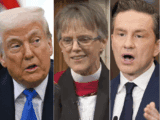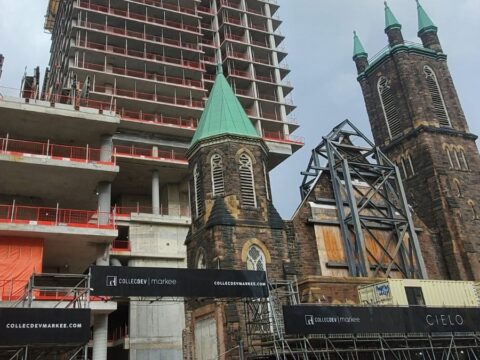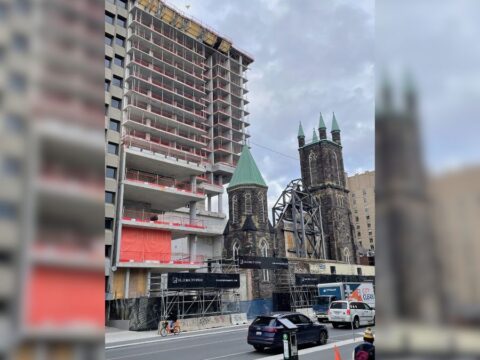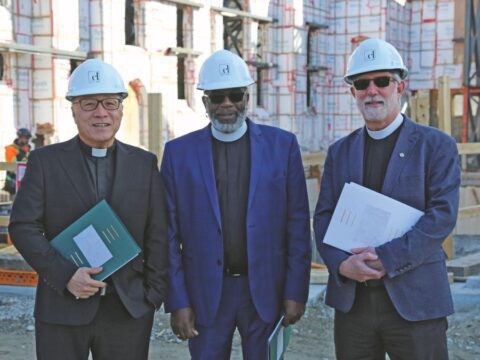United Church of Canada moderator Rt. Rev. Carmen Lansdowne is defending the General Council Executive’s (GCE) decision to close its meetings to the media, General Council Commissioners and others, while some in the church question her rationale.
In a statement posted to the General Council 44 website Friday, Lansdowne said there is “more to be gained” by closing the gatherings. A shorter, slightly different version of the statement was also sent directly to Broadview.
You may unsubscribe from any of our newsletters at any time.
“What the General Council Executive is working on is important and requires space and vulnerability and discernment, more generative conversations, and fewer traditional ‘proposals’ of the church than in the past,” she said.
“We spend time talking about our equity aspirations, decolonizing our work, making sure we are anti-racist in our approaches to defining the work of the church and being the body that has accountability for ensuring those things happen at the General Council Office and with its staff.”
Lansdowne pointed to a new relationship between the General Council Executive and the larger General Council that emerged out of the church’s restructuring. She said that new annual General Council meetings are intended to keep the General Council Executive and office accountable for doing the work of the denomination in between meetings, and that the job of the 15 people that are now elected to serve on the General Council Executive — a group that is not representative of the church across Canada – is to carry out governance work in between the General Council gatherings.
Lansdowne said she understood why Broadview took issue with the removal of an open invitation, but noted that the publication only attended three out of 10 GCE meetings in the last two years. She said she believed a story that came out of one of those meetings could have been garnered by reading summaries that Lansdowne said are posted right after GCE meetings or by waiting for the meeting’s full minutes.
“Does the church have a communication problem? Sure. But I’m not sure the decision to close the GCE meetings exacerbates that,” Lansdowne said.
Lansdowne also addressed what she saw as an erroneous perception that the move to close the meetings represented a consolidation of power on behalf of the national office. She said she thinks the biggest factor in the negative response is the fear of changing the church’s structure.
“Perhaps the fear and concern expressed by some is understandable — but what if we could suspend that fear and concern for a moment? What if we allowed the grace for this new GCE to get its feet under itself, to start to tackle the implications of the really big change management processes underway?” she asked.
Rev. Randy Naylor, who worked at the General Council office as general secretary of communications for more than a decade in the 1980s and 1990s, and was the denomination’s acting general secretary for a year, opposes the move, but not, he said, because he’s afraid of change.
“First of all, it flies in the face of our tradition,” he said. “Our tradition is that we are an open church, that our business is done in public view, recognizing that there are times when we need to go in camera, and discuss matters of personnel or some very nuanced issues. But that generally, we deal in an open and transparent way as we make our decisions.”
He said that the kinds of conversations that Lansdowne said GCE is having are important to hear about.
“And we need to hear the decision-making as it unfolds in order for us to fully understand and to be on board with whatever direction the General Council Executive then determines we’re going to go,” he said.
“It’s not enough to quote Scripture and invite us to be open to the spirit. Scripture also tells us not to hide anything under a bushel, our light under a bushel, it also tells us not to do things in secret. We can proof-text all we want,” he said.
“But the point is that we are the church, and that we are open and have been forever. And there’s no explanation in the letter that would say these decisions can’t be discussed in front of someone from the media or someone who is a member [and] wishes to visit.”
Naylor was not persuaded by Lansdowne’s point about Broadview only attending three out of 10 meetings in the past two years.
“It doesn’t matter whether or not media attend the meetings,” he said. “The fact is that media need to be able to attend and if media are not attending, that says something about our inability to reach out and engage the media in our decision-making.”
Keith Simmonds, who is a diaconal minister at Central Okanagan United in Kelowna, B.C., said he’s interested to see how the new governance model encourages staff to work toward the United Church’s intended focus of “seeking justice and trying to find a world that’s more, we could say, kindom-centred than corporate-capital-centred.”
More on Broadview:
- United Church’s General Council Executive closes doors to media
- The United Church has an ambitious plan to grow its membership
- United Church of Canada sued over alleged abuse in maternity homes
Simmonds has critiqued the denomination on a variety of issues, including its handling of Israel/Palestine, the pension fund and the benefits plan for employees. He also commented on the moderator’s recent letter in a United Church-adjacent Facebook group.
“We’ll see what they do to try and engage the deep spiritual-justice-focus wrestling of all of our folk and the communities around us,” he said. “It doesn’t seem like this was a good way to start it. But I don’t know. Maybe they just don’t feel trusted enough to trust us.”
David Wilson, a former editor/publisher of The United Church Observer (predecessor to Broadview), said that the decision surprised him.
“In my 30 years with The United Church Observer, I never came across an instance where the business of the church — unless it involved a delicate personnel matter or delicate legal issues — I never came across an instance where the doors to the decision-making process were slammed shut,” he said.
He used the example of the General Council Executive’s 1998 decision to apologize for The United Church of Canada’s role in residential schools, a move that went against “the advice of the church’s insurers and insurers’ lawyers.”
“I think the membership, the rank and file of the United Church, learned something about the nature of the denomination they belong to, through the reporting that we did coming out of that [General Council Executive] meeting,” he said.
Broadview editor/publisher Jocelyn Bell said the publication is advocating for open doors because the work of the GCE is vital to its readers.
“The benefits of having a Broadview journalist at the General Council Executive meetings are to hear the discussions that lead to a vote, including questions, critiques or considerations, and to get to know the people in the room,” she said.
“The minutes won’t tell us the nuances and subtleties of which motions took a lot of time and deliberation and which ones easily passed. Often the work of arriving at a decision is as important as the decision itself.”
She said the aim of being present at GCE is to become better informed as journalists, which leads to a better informed church body.
“The Broadview journalist in attendance comes away with a much better understanding of the business of the church than they can derive from minutes and briefings — and that knowledge carries through in all of their work, whether they’re producing an immediate news story after the meeting, or writing, assigning or editing future stories.”
CORRECTION: A previous version of this story stated that the GCE meetings had been moved in camera. That is not the case. This version has been corrected.
***
Emma Prestwich is Broadview’s digital editor.















I have previously written for Broadview, so some may consider me biased. It is interesting (on a number of levels) that when church membership numbers are plummeting, when new priests are being met with deeply held conservative traditionalism which resists any change, it is an “interesting” time to take the decision to restrict journalists – especially such “friendly” journalists as Broadview – from board meetings. The decision cannot help but appear secretive, anti-inclusionary, and out of step – all the things young people say is why they are leaving traditional Christian institutions – because they are acting like institutions and not like a church.
I agree with Rev. Randy Naylor. In these times of dwindling congregations and members, the General Council Executive making decisions behind closed doors will alienate long time members who are used to transparency and bring suspicion to new members who might have thought the United Church to be an open, transparent organization. Optics are as important as processes.
In the Federal Budget our government has stated this fact:
Diversity and Inclusion
It also commits to support local journalists in underserved communities and to help racialized and religious minority journalists present their experience perspectives. Our government considers this important, why doesn’t the General Council Executive consider this to be important?